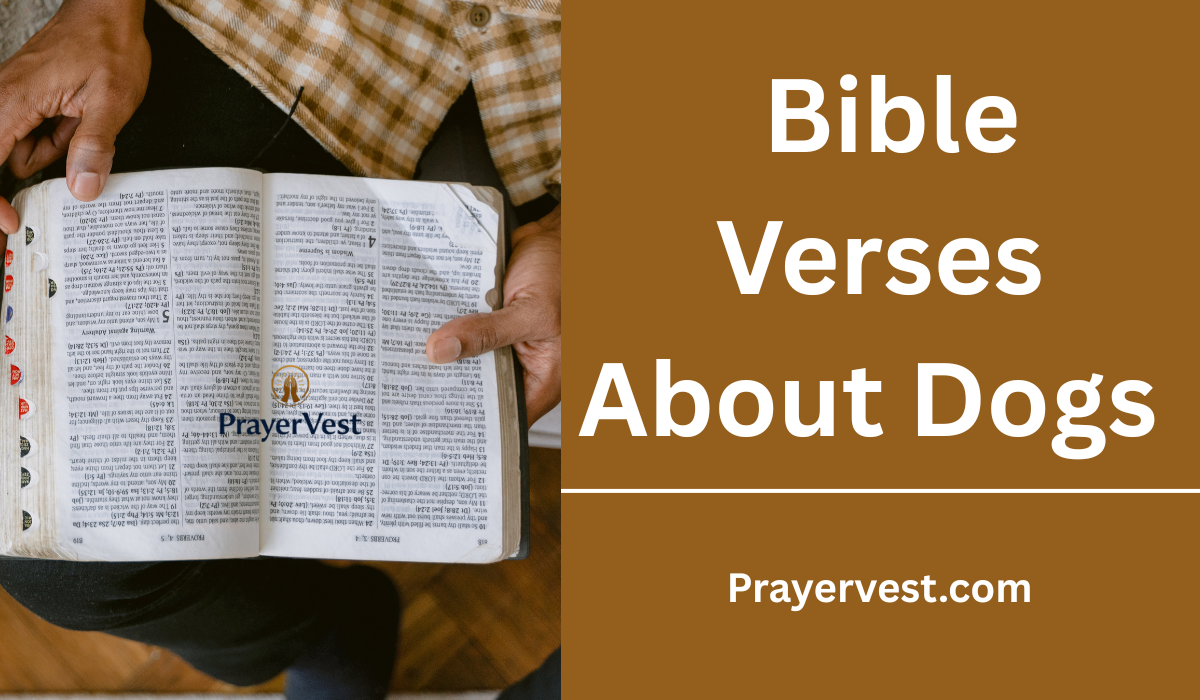The Bible makes multiple references to dogs, frequently in symbolic contexts that represent cultural perceptions of their function in prehistoric communities. Biblical references to dogs usually depict them as scavengers, filthy creatures, or emblems of disdain, in contrast to the loving companions we perceive them as today.
They were linked to property protection, scavenging, and street wandering. Even though these depictions could come across as unfavorable, they offer important insights into how dogs were viewed in biblical times and how spiritual lessons were communicated through their iconography.
Dogs are frequently used in Scripture as metaphors for disloyalty, spiritual impurity, or hostility toward God’s people. To highlight their disobedient or dishonorable actions, enemies of Israel or people who disobey God’s covenant were, for instance, occasionally likened to dogs.
In other instances, dogs are portrayed in scenarios from everyday life, such as licking wounds or foraging for food, which helped to root biblical lessons in the reality of everyday life. These pictures serve as a reminder to readers of the gravity of sin and the importance of being watchful in one’s spiritual life.


Studying Bible passages regarding dogs also helps one better comprehend how God uses relatable and useful imagery to convey truth. Dogs are used metaphorically to encourage believers to consider their own moral fiber, devotion, and obedience to God. We can learn about the cultural background of the biblical world and derive spiritual teachings for the present by studying these texts. The destructive qualities represented by the dog in Scripture are discouraged by these lines, which exhort us to pursue a life of fidelity, humility, and purity.
40 Powerful Bible Verses About Dogs (2026)
1. Exodus 11:7
“But among the Israelites not a dog will bark at any person or animal. Then you will know that the Lord makes a distinction between Egypt and Israel.”
This verse comes during God’s final warning to Pharaoh before the last plague. The mention of dogs highlights peace and divine protection—while Egypt would face destruction, not even a dog would disturb Israel. Dogs here symbolize both vigilance and the quiet assurance of God’s covering. It underscores how God can silence even the smallest threats when He sets His people apart for deliverance.
2. Judges 7:5
“So Gideon took the men down to the water. There the Lord told him, ‘Separate those who lap the water with their tongues as a dog laps from those who kneel down to drink.’”
In this moment, God uses the image of dogs drinking to separate Gideon’s army. Only a small group would be chosen to fight, emphasizing that victory does not come from numbers but from obedience to God. The comparison to dogs lapping water illustrates humility and readiness. Sometimes, God reduces our resources so that His strength is made perfect in our weakness.
3. 1 Samuel 24:14
“Against whom has the king of Israel come out? Who are you pursuing? A dead dog? A flea?”
David, pursued by King Saul, likens himself to a “dead dog”—a symbol of worthlessness in the cultural context of the time. His words reflect humility and the futility of Saul’s relentless chase. The verse reminds us that God often exalts the lowly, turning what the world considers insignificant into a vessel of great purpose. Even when others devalue us, God sees our true worth.
4. 2 Samuel 9:8
“Mephibosheth bowed down and said, ‘What is your servant, that you should notice a dead dog like me?’”
Here, Mephibosheth refers to himself as a “dead dog,” expressing deep humility before King David. Yet, David shows him kindness, restoring his family’s land and giving him a permanent seat at the king’s table. This verse reveals the grace of God: though we may see ourselves as unworthy, God welcomes us, restores us, and gives us a place of honor in His presence.
5. 2 Samuel 16:9
“Then Abishai son of Zeruiah said to the king, ‘Why should this dead dog curse my lord the king? Let me go over and cut off his head.’”
Abishai’s anger toward Shimei, who insulted David, shows how “dog” was often used as an insult in ancient Israel, symbolizing dishonor or worthlessness. Yet David restrains his men, recognizing that even insults might be allowed by God for a purpose. This verse reminds us to exercise restraint and humility, even when attacked, trusting God to vindicate us rather than retaliating in anger.
6. 2 Samuel 16:9
“Mephibosheth bowed down and said, ‘What is your servant, that you should notice a dead dog like me?’”
Mephibosheth’s self-description as a “dead dog” expresses feelings of shame and unworthiness due to his disability and family history. Yet David extends kindness and restores him to dignity. This passage illustrates God’s grace: even when we feel insignificant or broken, the Lord raises us up, giving us a place of honor at His table.
7. 1 Kings 14:11
“Dogs will eat those belonging to Jeroboam who die in the city, and the birds will feed on those who die in the country. The Lord has spoken!”
This prophecy through Ahijah the prophet was a judgment against Jeroboam’s house for leading Israel into sin. Dogs here symbolize disgrace and the harsh reality of divine judgment—an unburied body consumed by animals was a mark of shame. The verse underscores the seriousness of turning away from God and the certainty of His justice.
8. 1 Kings 16:4
“Dogs will eat those belonging to Baasha who die in the city, and the birds will feed on those who die in the country.”
Similar to Jeroboam’s fate, Baasha’s household faces God’s judgment for disobedience and idolatry. Dogs again serve as an image of shame, showing that wealth and power cannot shield anyone from divine accountability. This verse serves as a warning that sin brings destruction, and only repentance and obedience to God secure lasting honor.
9. 1 Kings 21:19
“Say to him, ‘This is what the Lord says: Have you not murdered a man and seized his property?’ Then say to him, ‘This is what the Lord says: In the place where dogs licked up Naboth’s blood, dogs will lick up your blood—yes, yours!’”
This was God’s message to King Ahab through Elijah after Ahab and Jezebel conspired to kill Naboth for his vineyard. The imagery of dogs licking blood conveys divine retribution—what was done in secret would be avenged openly. It reminds us that injustice does not escape God’s notice, and He will hold the wicked accountable for their deeds.
10. 1 Kings 21:23
“And also concerning Jezebel the Lord says: ‘Dogs will devour Jezebel by the wall of Jezreel.’”
The prophecy against Jezebel was fulfilled with chilling accuracy, showing the certainty of God’s word. Dogs here symbolize shame, disgrace, and divine justice. This verse is a sobering reminder that pride, wickedness, and cruelty invite judgment, but God’s justice always prevails.
11. 1 Kings 22:38
“They washed the chariot at a pool in Samaria (where the prostitutes bathed), and the dogs licked up his blood, as the word of the Lord had declared.”
This verse records the aftermath of King Ahab’s death in battle. The prophecy spoken against him was fulfilled as dogs licked his blood, demonstrating God’s justice. It underscores the truth that no one, not even a king, can escape divine judgment. When God speaks, His word is sure, and this passage reminds us of the seriousness of obedience.
12. 2 Kings 8:13
“Hazael said, ‘How could your servant, a mere dog, accomplish such a feat?’ ‘The Lord has shown me that you will become king of Aram,’ answered Elisha.”
Hazael refers to himself as a “dog” to express unworthiness and surprise at the prophecy that he would become king. Yet he later fulfilled this role, though with cruelty. This verse shows how God’s plans unfold even through unlikely or flawed individuals. It also reminds us that humility should mark our response when God elevates us.
13. 2 Kings 9:10
“As for Jezebel, dogs will devour her on the plot of ground at Jezreel, and no one will bury her.”
This reiteration of the prophecy against Jezebel emphasizes the certainty of divine judgment. Dogs again symbolize disgrace and the stripping away of false glory. It shows how wickedness, no matter how powerful or entrenched, will not escape God’s justice. The verse is a sober call to repentance and holiness.
14. 2 Kings 9:36
“They went back and told Jehu, who said, ‘This is the word of the Lord that he spoke through his servant Elijah the Tishbite: On the plot of ground at Jezreel dogs will devour Jezebel’s flesh.’”
The fulfillment of Elijah’s prophecy confirms that God’s word never fails. Jezebel, once a queen, was reduced to disgrace as her body was devoured by dogs. This verse highlights the stark contrast between human pride and God’s justice. It is a warning against arrogance and rebellion against the Lord.
15. Psalm 22:16
“Dogs surround me, a pack of villains encircles me; they pierce my hands and my feet.”
This Messianic psalm foreshadows the suffering of Christ. The imagery of dogs represents enemies who mock, attack, and seek to destroy the righteous. The piercing of hands and feet points directly to Jesus’ crucifixion. This verse reminds believers that even in suffering and opposition, God’s plan of redemption is being fulfilled.
16. Psalm 22:20
“Deliver me from the sword, my precious life from the power of the dogs.”
Here, “dogs” again symbolize hostile forces threatening the psalmist’s life. This plea for deliverance reflects a deep trust in God’s saving power. For believers, it illustrates the importance of prayer in times of distress, asking God to rescue us not only from physical enemies but also from spiritual forces that oppose us.
17. Psalm 59:6
“They return at evening, snarling like dogs, and prowl about the city.”
The psalmist describes enemies who behave like prowling dogs—relentless, threatening, and seeking destruction. This imagery portrays danger and fear but also reveals the faith of one who turns to God for safety. It encourages us to find refuge in the Lord when surrounded by hostility.
18. Psalm 59:14
“They return at evening, snarling like dogs, and prowl about the city.”
This repetition emphasizes the persistence of enemies. Like wild dogs circling prey, the psalmist’s adversaries seem unstoppable. Yet, the context of the psalm shows that God is more powerful than any enemy. Even when evil appears constant, the Lord is our shield and defender.
19. Proverbs 26:11
“As a dog returns to its vomit, so fools repeat their folly.”
This proverb uses the imagery of a dog to describe foolishness—returning to sin or bad habits repeatedly. It is a vivid picture of how destructive it is to persist in unwise choices. The verse challenges us to learn from mistakes, seek wisdom, and allow God to transform our behavior rather than reverting to what harms us.
20. Ecclesiastes 9:4
“Anyone who is among the living has hope—even a live dog is better off than a dead lion!”
In this proverb-like statement, the writer contrasts life and death using dogs and lions. Though a lion is majestic and powerful, life itself—symbolized even in a lowly dog—is more valuable than death. This verse emphasizes hope and the gift of being alive, reminding us to cherish life and use it wisely for God’s glory.
21. Isaiah 56:10
“Israel’s watchmen are blind, they all lack knowledge; they are all mute dogs, they cannot bark; they lie around and dream, they love to sleep.”
Here, dogs are used to describe negligent leaders who fail in their duty to protect and warn the people. Instead of being alert and faithful watchmen, they are compared to silent dogs who refuse to bark. This verse is a warning against spiritual laziness and a call to vigilance, especially for those entrusted with leadership.
22. Isaiah 56:11
“They are dogs with mighty appetites; they never have enough. They are shepherds who lack understanding; they all turn to their own way, they seek their own gain.”
Continuing the imagery, dogs here symbolize greed and insatiable desire. The verse condemns leaders who exploit others for selfish gain rather than serving faithfully. It warns us of the dangers of unchecked appetite and selfish ambition, reminding believers that true leadership reflects sacrifice, wisdom, and care.
23. Jeremiah 15:3
“I will send four kinds of destroyers against them, declares the Lord: the sword to kill and the dogs to drag away, and the birds and the wild animals to devour and destroy.”
In this prophecy of judgment, dogs symbolize instruments of destruction used to carry out God’s justice. It is a stark reminder of the consequences of rebellion and unfaithfulness to God. This verse shows that even nature can serve as an agent of divine discipline when humanity turns away from the Lord.
24. Matthew 7:6
“Do not give dogs what is sacred; do not throw your pearls to pigs. If you do, they may trample them under their feet, and turn and tear you to pieces.”
Jesus uses dogs and pigs symbolically to warn against offering holy truths to those who will mock or despise them. This verse teaches discernment in sharing spiritual wisdom and cautions believers not to waste what is holy on hearts hardened against God. It highlights the importance of wisdom, patience, and sensitivity in evangelism and ministry.
25. Matthew 15:26
“He replied, ‘It is not right to take the children’s bread and toss it to the dogs.’”
Jesus’ words to the Canaanite woman reflect the cultural view of Gentiles as “dogs,” outsiders to Israel’s covenant blessings. Yet the woman’s humility and faith overcame the barrier, and Jesus honored her request. This verse demonstrates that God’s grace is for all people, not limited by ethnicity, status, or background.
26. Matthew 15:27
“‘Yes it is, Lord,’ she said. ‘Even the dogs eat the crumbs that fall from their master’s table.’”
The woman’s response is a powerful display of faith and persistence. She accepts the metaphor yet claims a place of blessing even for those considered outsiders. Jesus commends her faith, showing that God responds not to status or tradition but to sincere belief. This verse encourages us to approach God with humility and persistence, trusting His mercy.
27. Luke 16:21
“Longing to eat what fell from the rich man’s table. Even the dogs came and licked his sores.”
In the parable of the rich man and Lazarus, dogs are pictured as more compassionate than the wealthy man, for they licked the sores of poor Lazarus. This verse contrasts the coldness of human pride with the humble compassion seen even in animals. It challenges us to be merciful and attentive to those in need.
28. Philippians 3:2
“Watch out for those dogs, those evildoers, those mutilators of the flesh.”
Paul uses the word “dogs” metaphorically to describe false teachers who corrupted the gospel with legalism. This strong language highlights the seriousness of defending the truth of Christ. Believers are warned to stay alert, guarding against anyone who distorts God’s Word or seeks to lead others astray.
29. 2 Peter 2:22
“Of them the proverbs are true: ‘A dog returns to its vomit,’ and, ‘A sow that is washed returns to her wallowing in the mud.’”
Peter applies this proverb to false teachers who turn back to sin after knowing the truth. Like dogs returning to vomit, they repeat destructive behavior. This verse warns against abandoning the gospel and illustrates the danger of reverting to old sinful patterns after receiving God’s grace.
30. Revelation 22:15
“Outside are the dogs, those who practice magic arts, the sexually immoral, the murderers, the idolaters and everyone who loves and practices falsehood.”
In the final chapter of Scripture, “dogs” symbolize those excluded from the New Jerusalem—those who reject God through persistent sin and falsehood. This verse reminds us that sin separates us from God’s presence, but through Christ’s blood we can be made holy and included in His eternal kingdom.
31. Exodus 22:31
“You are to be my holy people. So do not eat the meat of an animal torn by wild beasts; throw it to the dogs.”
This instruction given to Israel highlights God’s call to holiness and purity. Meat from torn animals was considered unclean, and giving it to dogs signified separating what was impure from God’s people. The verse reminds us that God calls His children to live differently, avoiding what contaminates both body and spirit.
32. 1 Samuel 17:43
“He said to David, ‘Am I a dog, that you come at me with sticks?’ And the Philistine cursed David by his gods.”
Goliath mocks David by comparing himself to a dog, implying insult and disdain. Yet this arrogant remark sets the stage for God’s power to be revealed through David’s victory. The verse reminds us that human pride is no match for divine strength, and even the lowly can overcome giants with God on their side.
33. 2 Samuel 3:8
“Abner was very angry because of what Ish-Bosheth said. So he answered, ‘Am I a dog’s head—on Judah’s side? This very day I am loyal to the house of your father Saul.’”
Abner uses the term “dog’s head” as an insult, expressing frustration at being accused unfairly. In this context, dogs symbolize contempt and dishonor. The verse illustrates how words and accusations can stir conflict, reminding us to guard our speech and deal with others in truth and respect.
34. 2 Samuel 9:8
“Mephibosheth bowed down and said, ‘What is your servant, that you should notice a dead dog like me?’”
Mephibosheth humbly calls himself a “dead dog,” expressing deep unworthiness before King David. Yet David’s kindness restored his dignity. This passage paints a picture of God’s grace toward us—though we may feel unworthy, He lifts us up and gives us a seat at His table through Christ.
35. 2 Samuel 16:9
“Then Abishai son of Zeruiah said to the king, ‘Why should this dead dog curse my lord the king? Let me go over and cut off his head.’”
Shimei insulted David, and Abishai’s reaction was to defend the king by violence. The phrase “dead dog” again symbolizes worthlessness. Yet David chose restraint, leaving judgment to God. This verse challenges us to respond to insults with humility, allowing God to be our defender.
36. Job 30:1
“But now they mock me, men younger than I, whose fathers I would have disdained to put with my sheep dogs.”
Job laments that even the lowest of society now mock him in his suffering. His reference to sheep dogs shows his despair and the reversal of his former honor. This verse highlights how suffering can strip away human dignity, yet it also points us to the hope that God restores those who endure trials.
37. Psalm 68:23
“That your feet may wade in the blood of your foes, while the tongues of your dogs have their share.”
This poetic imagery describes God’s ultimate victory over His enemies. Dogs are pictured here as participating in the aftermath of battle, a symbol of complete triumph. The verse reminds us that God will one day bring justice and vindication for His people against all evil.
38. Psalm 74:19
“Do not hand over the life of your dove to wild beasts; do not forget the lives of your afflicted people forever.”
Though not directly naming dogs, this verse reflects the same theme of animals preying on the vulnerable. The psalmist pleads for God’s protection, symbolizing how enemies threaten God’s people like beasts. It reminds us to trust in the Lord’s care and cry out for His deliverance in times of oppression.
39. Psalm 80:13
“Boars from the forest ravage it, and insects from the fields feed on it.”
This verse continues the imagery of animals representing destructive forces, much like dogs in other Scriptures. It depicts enemies devouring Israel, God’s vineyard. The passage is a call for God’s intervention, showing that only His protection can preserve His people from being consumed by adversaries.
40. Lamentations 4:10
“With their own hands compassionate women have cooked their own children, who became their food when my people were destroyed.”
While dogs are not named here, the context of destruction and uncleanness echoes earlier images where dogs consumed the fallen in judgment. This verse demonstrates the devastating consequences of sin and rebellion. It reminds us of the depth of human suffering without God’s mercy, and our need for repentance and restoration.
Conclusion
In conclusion, the Bible’s allusions to dogs offer a distinctive viewpoint on how ancient people perceived animals and how spiritual teachings were conveyed through their images. These scriptures are potent reminders of the gravity of sin, disobedience, and spiritual impurity, even though the majority of mentions depict dogs as filthy scavengers or emblems of disdain. The biblical authors frequently employed well-known imagery, such as dogs running the streets or grazing on leftovers, to help God’s people understand timeless lessons about humility, righteousness, and religious alertness.
At the same time, these sections inspire contemporary readers to reflect on the metaphors’ deeper meanings and see past cultural differences. Scripture’s depictions of dogs force us to consider our own allegiance, obedience, and commitment to God. They serve as a reminder to desire purity and faithfulness rather than the attitudes and actions that desecrate Him. Believers can develop a deeper comprehension of God’s Word and apply its eternal wisdom to their everyday walk with Him by thinking about these verses.






